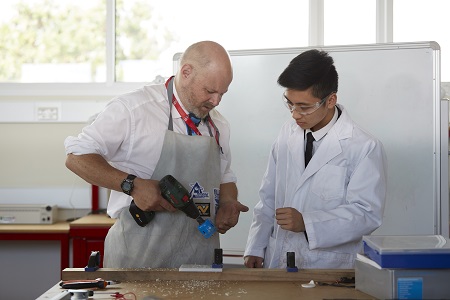
With the world becoming increasingly connected, and the workforce becoming increasingly automated, pressure is on educators to ensure that students leave school as capable, innovative and even entrepreneurial citizens.
At Melbourne’s Caroline Chisholm Catholic College, head of maths Colin Chapman has been opening up some exciting new learning opportunities for students in this context.
In his maths classes, Chapman provides students with open-source, accessible applications that may be harnessed to create interactive digital portfolios. These allow STEM students to narrate their creative journey, inclusive of successes and failures, as they seek to provide evidence of achievement in their learning.
Chapman was recently invited to speak at the 16th International Conference on Excellence, Gifted Education, Innovation and Creativity in Basic-Higher Education and Psychology in Paris, France.
At the global conference, which runs from July 3-6, Chapman will present his abstract entitled: ‘Systems engineering: an approach to STEM that creates digital portfolios to reward risk-taking habits during learning opportunities’.
Below, The Educator speaks to Chapman to find out more.
TE: What can you tell us about the abstract you’ll be presenting at the conference?
CC: Rewarding risk-taking effectively and efficaciously continues to challenge participants in STEM learning opportunities. I’ll be presenting about an innovative assessment program that rewards participants for ‘failure’ as they conceptualise, investigate and develop intentions towards solutions, then carry out plans and evaluate any results. I will also unpack a collection of real digital portfolios to discover how learners valued getting things wrong on their way to getting things right. Authentic reward for risk-taking is foregrounded in this workshop, for learning environments that explore systems approaches to developing solutions to real problems.
TE: Can you share some examples of how you’ve driven improved STEM outcomes in your role at Caroline Chisholm Catholic College?
CC: We have taken a holistic approach to STEM, moving beyond the Science, Technology, Engineering and Mathematics of the acronym. We embrace a Systems Thinking approach that strives to understand interconnectedness between fields of inquiry, feedback mechanisms, structure, the dynamic nature of problems and proposed solutions, issues of scale and the importance of modelling.
Opportunities to experiment with ideas, develop intentions and record decision-making are key aspects of our risk-taking culture in Systems Engineering.
TE: In your view, is there anything critical missing from the ongoing debate about how to prepare students for the future workforce, and society – either in the context of STEM or more broadly?
CC: There is a rhetoric surrounding the identified need for learners to become ‘risk-takers’. While the rhetoric is important, action is what is needed. We have a view that assessment structures must be developed that allow a variety of expressions of achievement. These structures must allow the learner to keep their inquiry objectives in sight, while also providing a narrative of the intentions, plans, implementations, ongoing evaluations, as well as all of the episodes along that way that did not work out. Rewarding learners meaningfully for taking risks is a particular concern that we will continue to work at.
Related stories:
Principal takes mentoring to the next level
From best practice to next practice


